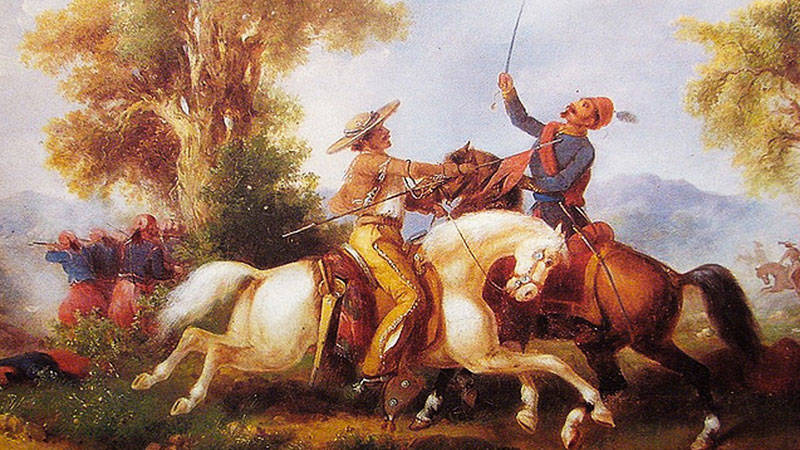This piece was inspired by an episode of The Cooler, KQED’s weekly pop culture podcast. Give it a listen!
Think You Know What Cinco de Mayo Means? You're Probably Wrong

Most people are familiar with the idea of Cinco de Mayo, but the knowledge often ends there.
See exhibit A:
Right after this photo was taken, Donald probably explained Cinco de Mayo's significance: It represents Mexico's Independence Day, duh! Yeah, no. That momentous event is celebrated on September 16. And, despite what the inside of most bars on May 5 might lead one to believe, Cinco de Mayo isn't a holiday in honor of the margarita. They're delicious and probably deserve their own day; this just happens to not be the one. Another thing Cinco de Mayo is not: an excuse for non-Mexicans to don ill-advised sombreros or ponchos. Keep it cute, people.
So now that we know what the holiday isn’t, let’s talk about what it really signifies:
Before we get to May 5, 1862, we should lay down some foundational knowledge because everything is connected and historical events don't occur in a vacuum.
After Mexico declared its independence from bugaboo Spain in 1821, there was a lot of instability. Now that the colonial presence was gone, what should replace it? A Catholic monarchy or a republic? It took some time to figure this all out.
Then in 1836, some Americans and Mexicans revolted against the Mexican government in what is now called the Texas Revolution and created a separate republic because they felt like it. This did not go over well.
To assuage the Mexican government, U.S. President Polk was like, Ok, guys, calm down. We’ll buy this territory from you. Mexico was like Um, you don’t even go here. F*ck off. Polk, who was famous for banning booze, card playing and dancing from the White House, continued his streak of being the worst and ordered troops into Mexican territory, against the protestations of people like Abraham Lincoln, Frederick Douglass and Henry David Thoreau. This resulted in what our textbooks call the Mexican-American War and what the Mexicans call Primera intervención estadounidense en México (First Intervention of the United States in Mexico). Did you catch that "first"? Mexico, telling it like it is!
After that fiasco, which resulted in Mexico losing two-thirds of its territory, including land we now call Texas, New Mexico, Arizona, and California, there was something called the Reform War, which was a civil dispute over how involved the church should be in government. All of these wars left Mexico bankrupt. They didn't have the money to pay their foreign debts so France, Britain and Spain sent naval forces to proclaim, loud and clear, in person: Bitch better have my money!
Britain and Spain eventually negotiated and went home, but France, under the leadership of Napoleon III (the nephew of Napoleon Bonaparte) saw an opportunity to establish an empire in Latin America that would benefit French interests. And because that wasn't enough of a buttinsky move, he also wanted to meddle in the U.S. Civil War in support of the Confederacy.
So the French attacked, confident that they would handily conquer because they hadn't been defeated in the past 50 years and the Mexican forces were outnumbered and undersupplied. Initially, the Mexican government retreated and Napoleon III's plan was going swimmingly...until the two sides met near a town called Puebla.
Despite being the premiere army in the world, the French were crushed by the poorly equipped group of Mexicans. David and Goliath realness! The war didn’t end for another 6 years, but the victory at Puebla came to symbolize Mexican unity and patriotism.
Since the Battle of Puebla, no country in the Americas has been invaded by a European military force. And if Mexico hadn’t won, France would have supported the Confederates and our own history could have turned out a lot differently.
The battle's anniversary has been celebrated in California since 1863, while—plot twist—the day is "virtually ignored" in Mexico. The holiday gained more prominence in California during the Chicano movement in the 1960s and crossed over to the rest of the country in the 1980s, when beer companies used the holiday as a way to market their products.
If you didn't know, now you know.
This educational moment is brought to you by the More You Know star, in conjunction with Human Beings Against Donald Trump Ruining Taco Bowls. Spread the word!
Listen to The Cooler hosts talk about Cinco de Mayo, as well as the best and worst celebrity apologies and the sad implications for Lil Kim's facial transformation.


